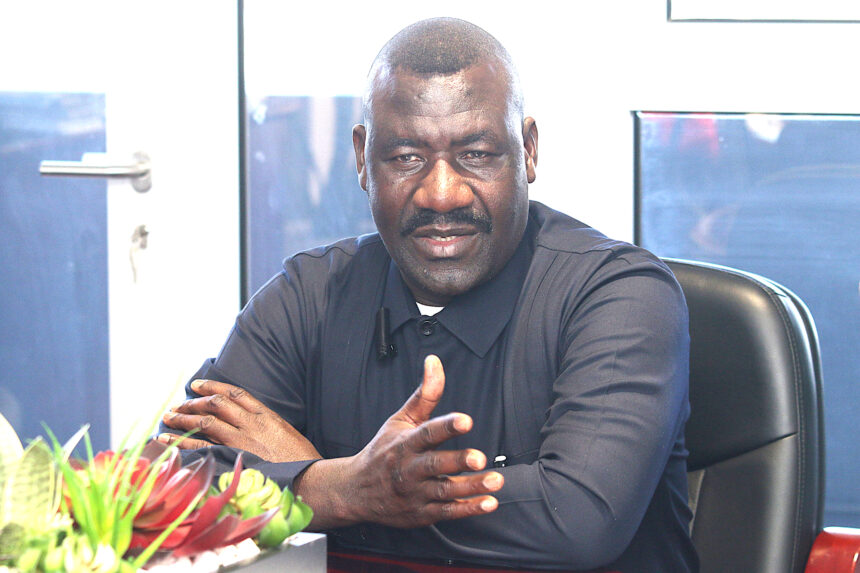Police Inspector General Joseph Shikongo has described his recent trips to China and the United States as highly productive.
He highlighted the knowledge he gained in policing strategies and Namibia’s campaign for the vice presidency of Interpol.
Shikongo revealed this during an extensive interview with New Era last Wednesday before he left for China to attend the Global Security Cooperation Summit in Lianyungang, Jiangsu province.
He reflected on his four-day visit to China from 20 to 24 June at the invitation of China’s minister of public security.
“We were there to learn from their strategies in handling crime, particularly in a country of 1.4 billion people,” Shikongo noted.
“What stood out is the level of public safety, especially in large cities like Beijing. Despite having a population of 30 million, no crimes were reported during our stay.
We visited a law-enforcement centre to observe how the Chinese police handle offenders, crime victims and all crimes in overpopulated areas, particularly Beijing. In three of the biggest cities in China, public safety standards are all the same,” he added.
His invitation came after a Chinese delegation visited Namibia in 2023, signalling the growing relationship between the two nations.
Further, between 24 and 26 June, Shikongo and his delegation attended the United Nations Intergovernmental Police Cooperation Programme (UNIPOC).
The tour included insights into China’s ‘smart city’ concepts – integrated surveillance technologies that contribute to public safety. “Their smart-city infrastructure is something we are eager to explore and adapt for Namibia as our cities expand,” Shikongo said.
Unlimitted
He said Namibia’s relationship with China is not limited to police work, but has also expanded through platforms like the United Nations and Interpol, where both countries hold membership.
“China’s focus on tackling transnational organised crime aligns with Namibia’s concerns. Our collaboration at both the national and international levels is key to addressing these shared issues,” Shikongo added.
Candidate Nainda
Namibia’s deputy inspector general for administration, Anne-Marie Nainda, has emerged as a strong candidate for the vice presidency of Interpol, marking a significant milestone for both her country and the global policing community.
Shikongo said as a seasoned law-enforcement officer with decades of experience, Nainda represents not only Namibia’s growing influence in international policing, but also highlights the increasing role of women in law-enforcement leadership worldwide.
“Her extensive experience and dedication to international policing make her an ideal candidate. Namibia stands ready to bring fresh perspectives and strong leadership to Interpol.”
Nainda’s distinguished career within the Namibian Police Force has earned her widespread recognition for her contributions to crime prevention, law-enforcement administration and international cooperation.
“Having risen through the ranks, she has played a key role in advancing Namibia’s policing strategies, particularly in areas of organised crime, gender-based violence and community safety,” he said.
Her candidacy comes at a pivotal time for Namibia, which has been actively engaged in strengthening relationships with other countries through platforms such as the UNIPOC and Interpol.
As a representative of a country with a growing international profile, Nainda’s experience and leadership are seen as key assets in addressing global challenges such as human trafficking, terrorism, cybercrime, and transnational organised crime.
Shikongo said if successful, Nainda would not only be the first Namibian, but also one of the few women to hold such a high-ranking position in Interpol’s history, marking a significant achievement in the pursuit of gender equality in international policing leadership.
Her election would symbolise a historic moment for Namibia, and solidify the country’s standing as a key player on the global stage of law-enforcement, the police supremo continued.
UNIPOC
Furthermore, Shikongo said he has attended international engagements framed within the context of the UNIPOC, a global initiative aimed at fostering collaboration among police forces worldwide, that was held in New York.
His trip to the United States, as part of his Interpol campaign, also involved his attendance at the United Nations Chiefs of Police Summit (UNiCoPP) summit, where global police leaders shared strategies and best-practices.
“We learned so much from each other, and this experience – combined with our collaboration with China – will significantly strengthen our policing efforts in Namibia,” Shikongo added.
UNIPOC, a subsidiary of the UN’s Department of Peacekeeping Operations, provides a platform for exchange of knowledge, experiences and resources to strengthen global law-enforcement and peacekeeping missions.
Growth
Namibia’s role in UNIPOC has grown in recent years, with the Namibian Police Force becoming an active participant in international peacekeeping operations, particularly in Africa.
Through UNIPOC, Namibia has benefited from training, logistical support, and joint initiatives with international police forces, including China.
Shikongo’s participation at the recent UNiCoPP in New York City was part of Namibia’s broader strategy to campaign for the vice presidency of Interpol.
“Exchanging knowledge with other police chiefs is invaluable. It strengthens our capacity, and bolsters our candidacy for Interpol’s leadership,” he said.
As Namibia seeks to secure the Interpol vice presidency, UNIPOC has served as a crucial network for Shikongo’s interactions with police chiefs from across the globe.
“I have engaged in bilateral meetings with police representatives from Europe including Netherlands, Germany, Russia, Belgium and Turkey. These discussions centred around the candidacy of our executive member Nainda for the Interpol vice president’s position.
“Through UNIPOC, we have established strong relationships that will support Namibia’s candidacy. Our cooperation with China, in particular, has been instrumental in showing that Namibia is ready for leadership on the international policing stage,” he added.


